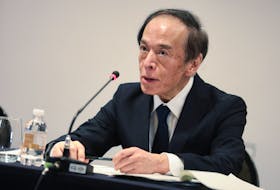Newfoundlanders and Labradorians might be waiting with bated breath to see how the Muskrat Falls hydroelectric project will affect the province’s long-term future, but the much-maligned case of the Upper Churchill Falls hydroelectric project has made its way to the nation’s top court.
Lawyers for Churchill Falls Labrador Corp. Ltd. (CFLCo) and for Hydro-Quebec argued their case in the Supreme Court of Canada on Tuesday.
At the centre of the hearing was whether the contract between both parties should be adjusted to reflect good faith principles and vastly different economic circumstances. In the case of the Upper Churchill project, Hydro-Quebec has garnered more than $27 billion, thanks largely to being able to purchase power at low, fixed prices and then resell it to generate profits.
Newfoundland and Labrador, meanwhile, has gained roughly $2 billion from the deal.
“This case is about a long-term joint venture contract based at its core on an equitable sharing of risks and benefits, radically changed circumstances which resulted in unforeseen dramatic increases in the value of the venture, and an appropriation by Hydro-Quebec relying on the literal text of a single clause in the contract of virtually all the value of the joint venture for over 30 years now and which will continue to occur for another 24 years unless this court intervenes,” CFLCo lead lawyer Doug Mitchell told the court.
Hydro-Quebec, meanwhile, argued that it was not a joint venture and that it was the financing terms of CFLCo that defined the terms of the contract, and Hydro-Quebec assumed the risk from the lenders, even if CFLCo was the developer.
“As far as price stability that Hydro-Quebec was benefitting from in light of the contract, it is the reflection of the foreseeability and stability of prices that are a characteristic relating to hydroelectricity,” stated Hyrdo Quebec lawyer Pierre Bienvenu.
“Since CFLCo knew that Hydro-Quebec had a huge hydroelectric potential that was undeveloped in Quebec, CFLCo was aware that in order to interest Hydro-Quebec … in the energy from Churchill Falls, it had to ensure that there would be a stability in prices through the length of the contract.”
Under the 1969 terms, Hydro-Quebec agreed to buy almost all the energy from the Churchill Falls plant. The deal set a fixed price for that power that would decrease in stages over time.
Various aspects of the contract have already been argued before the top court on different legal principles, twice, without success.
This most recent challenge started when CFLCo — a subsidiary of Nalcor Energy — went to Quebec Superior Court in 2010. It argued unsuccessfully that profits of such magnitude from electricity were unforeseen in 1969 and that Hydro-Quebec had a duty to renegotiate terms.
The Quebec Court of Appeal upheld the lower court’s 2014 decision, agreeing the provincially owned power utility has no obligation to reopen the agreement.
“It is inappropriate to re-examine the parties’ circumstances when they signed the contract,” ruled the five appeal court judges. “The uncontradicted evidence establishes that they knew that the price of hydroelectric power was subject to fluctuation but they voluntarily agreed to fix the price.”
The decision also said the general principle of “good faith,” as found in Quebec’s civil code, doesn’t apply to Churchill Falls, as the contract has remained “profitable” for Newfoundland.
Mitchell agreed that CFLCo is receiving what it is supposed to as set out in the contract, but suggested “that’s simply a literal reading of the contract.”
CFLCo counsel Audrey Boctor added that the appeal court trial judge adopted a flawed vision of contracts that suggests sophisticated parties don’t have heightened duties.
“That is wrong in law,” she stated. “Some of the most sophisticated parties enter into contracts like partnership, joint ventures and they have heightened duties. Being sophisticated doesn’t give you a free pass.
“The trial judge basically said, ‘If Churchill Falls was unhappy they should have run the power into the river until they had Hydro-Quebec where they wanted and gotten a better deal.’ It’s the idea of these sophisticated parties negotiating pied a pied and the moment the contract is signed it’s forever set in stone and can never be changed. That’s not how contract theory works anymore.”
Hydro-Quebec maintains that CFLCo’s arguments contradict the findings of fact at both levels of Quebec’s lower courts.
“The remedy that is being sought out by CFLCo does not attempt to re-establish a contractual equilibrium of balance that unforeseeable circumstances would have broken or breached, but rather they’re asking for the court to establish a new balance that’s detached from the original contract and detached from the original contractual equilibrium.”
A decision from the Supreme Court is not expected for several months.
— With files from Sue Bailey of The Canadian Press
Twitter: kennoliver79








